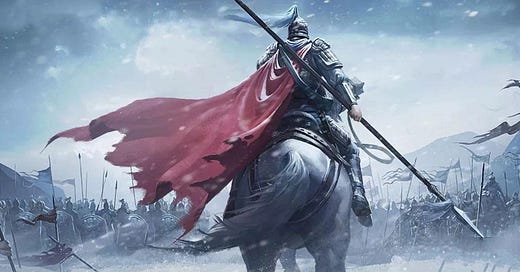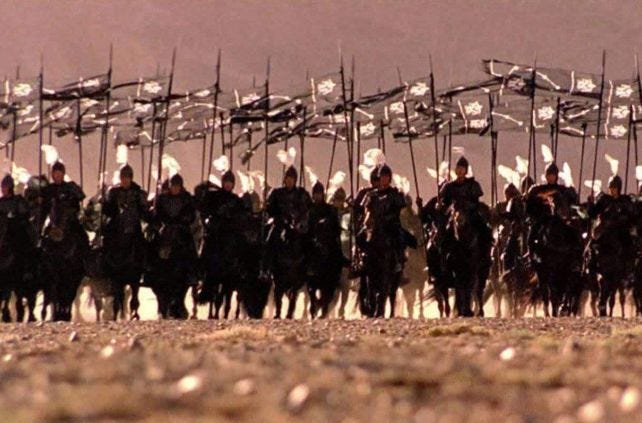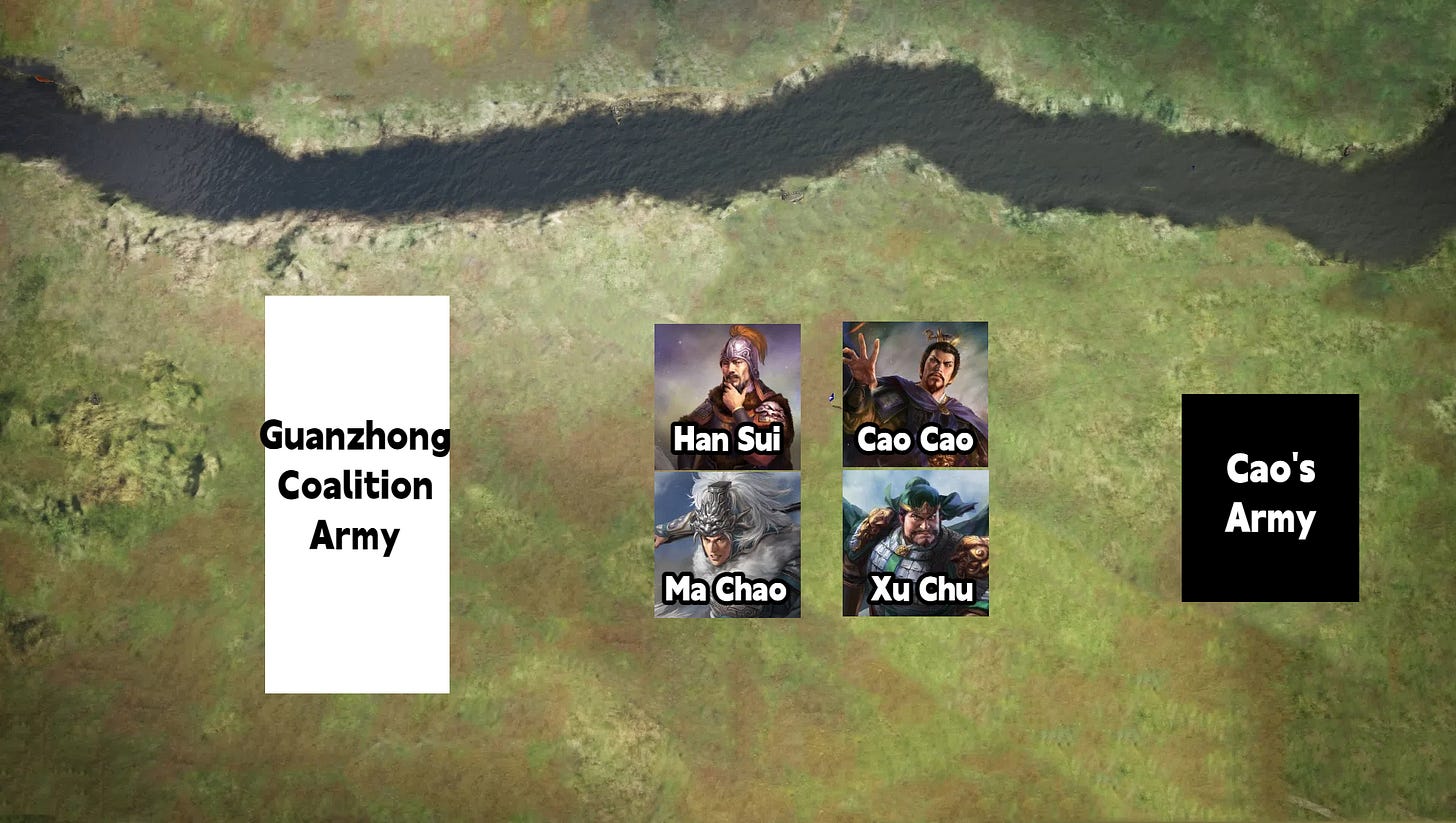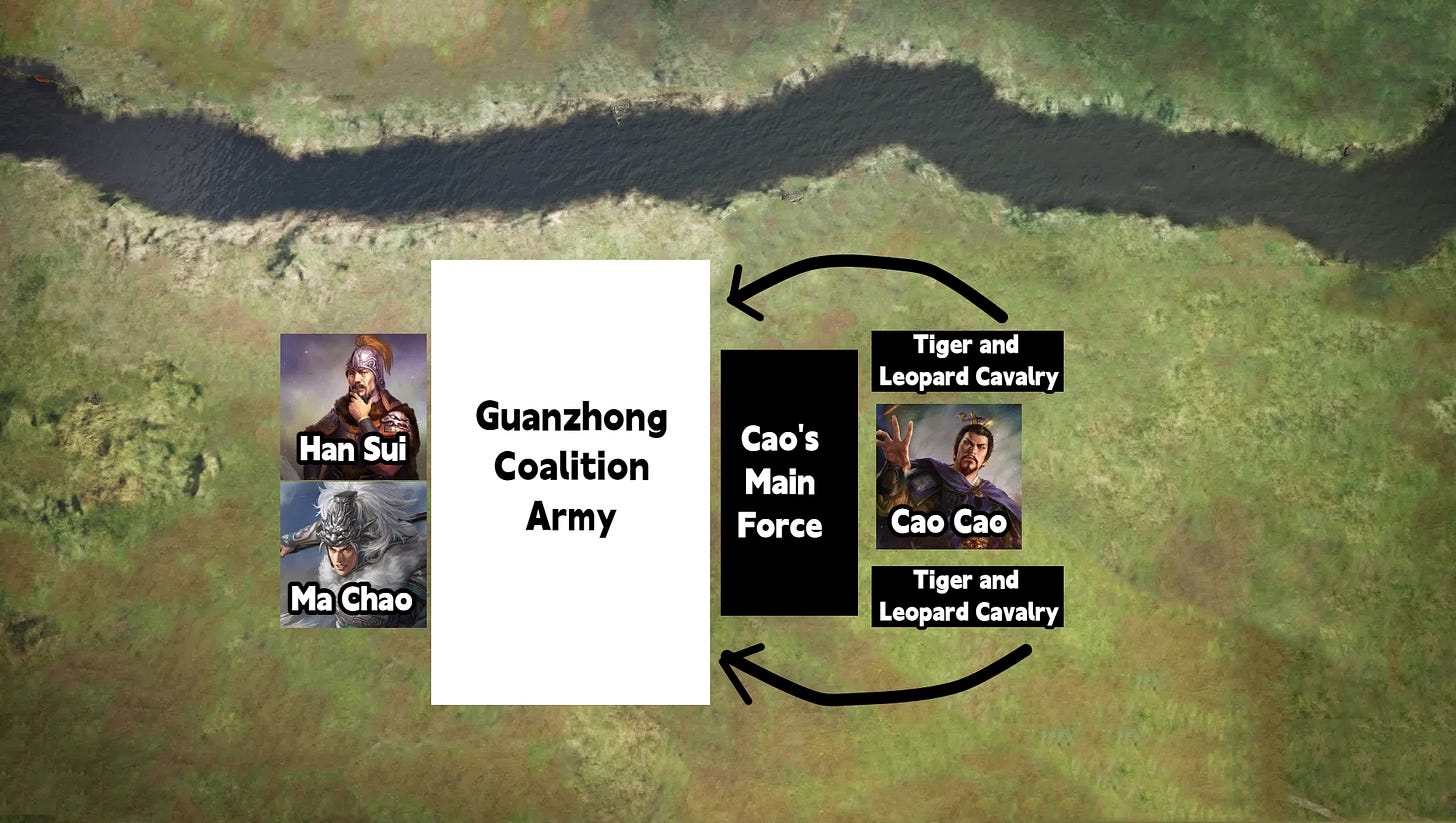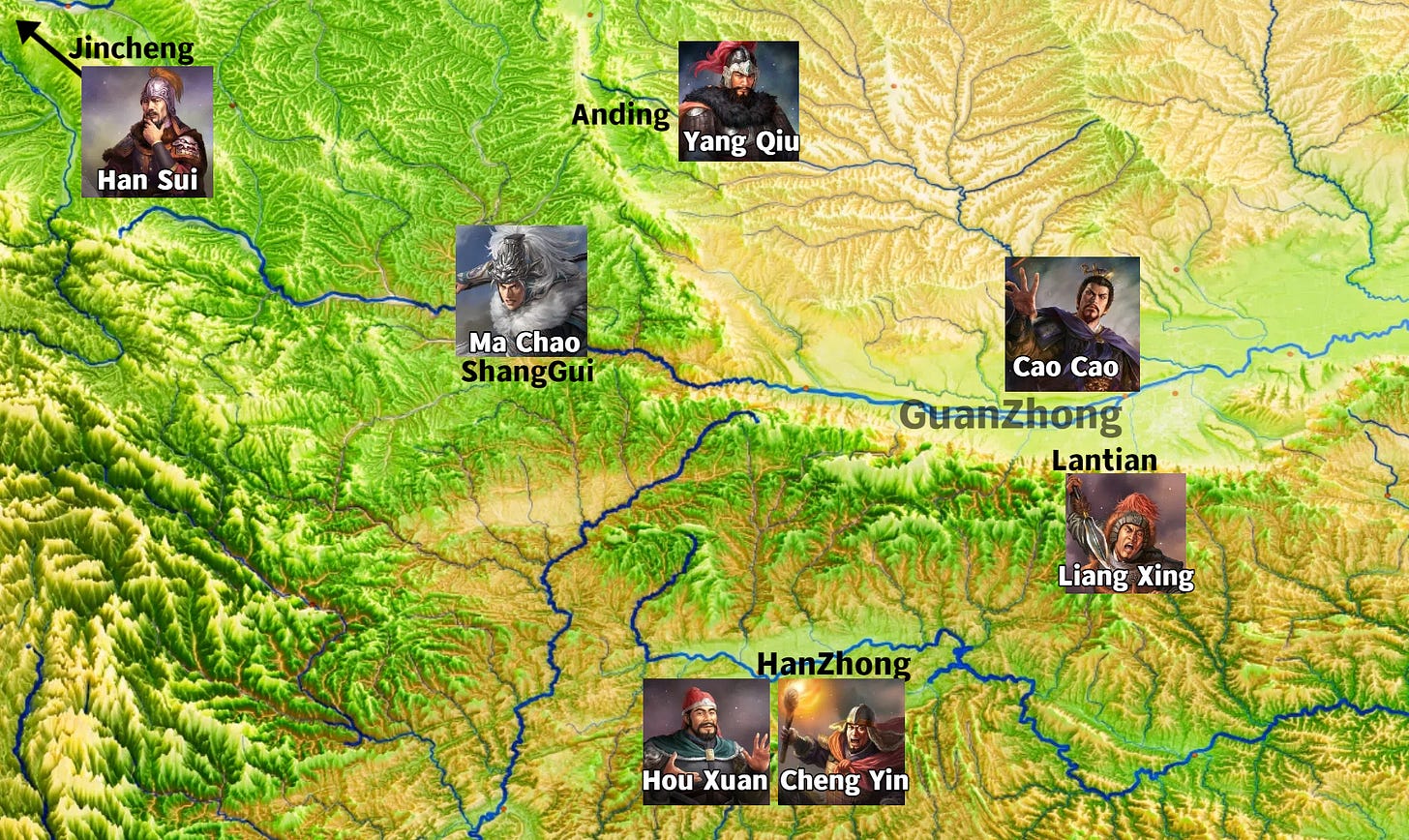Previous Chapter :How Close Was Ma Chao to Killing Cao Cao?
Under Jia Xu’s advice, Cao Cao pretended to accept the ceasefire terms proposed by the Guanzhong关中 allied forces—ceding territory and sending hostages. The two sides agreed to meet face-to-face on the battlefield.
Cao Cao abandoned his previous defensive and passive strategy, handpicking 5,000 cavalry clad in gleaming armor, arrayed in formation so dazzling under the sun that the enemy troops were struck with awe.
Though Cao Cao’s reputation was legendary, most soldiers from Guanzhong and Liangzhou had never seen him in person, so they crowded forward to catch a glimpse.
Cao Cao laughed and said, "There’s nothing special to see. I’m just an ordinary man—no four eyes or two mouths—just a bit more wisdom, that’s all."
At the time, Cao Cao had only Xu Chu许褚 by his side. Ma Chao马超, confident in his own martial prowess, considered ambushing Cao Cao. But having heard of Xu Chu’s fearsome reputation, he asked, "Lord Cao, where is your ‘Tiger Marquis’?"
Cao Cao gestured beside him.
Ma Chao saw Xu Chu glaring at him with a ferocious, almost vengeful expression, and dared not act.
Later, Cao Cao held a private conversation with Han Sui韩遂.
Han Sui was a Han Chinese, born into a prominent clan in Jincheng金城 Commandery(Today’s Lanzhou兰州 City). Before the Yellow Turban Rebellion, he had spent time in the Capital Luoyang洛阳 on official business, where Cao Cao served as a court official. The two had known each other for years.
Though Han Sui was older than Cao Cao, his father had been selected for office in the same year as Cao Cao, so their reunion was warm and familiar.
Deliberately avoiding current military affairs, Cao Cao reminisced with Han Sui about old times, even laughing and clapping hands in amusement.
After a long talk, they finally rode back to their respective camps.
When Ma Chao and others asked Han Sui, "What did you and Cao Cao discuss?" Han Sui simply replied, "Nothing."
This angered Ma Chao and his allies. "Oh? In front of tens of thousands of soldiers, you wasted time on useless small talk? Who would believe that?"
Suspicion grew that Han Sui and Cao Cao had secretly struck a deal.
After returning to camp, Cao Cao sent Han Sui a letter, deliberately altering phrases as if Han Sui himself had made the edits.
When Ma Chao and the others saw the letter, their distrust deepened.
Seizing the moment, Cao Cao issued a formal challenge, setting a date for battle.
With supplies running low, the Guanzhong coalition was eager to end the stalemate and agreed to fight.
In this battle, Cao Cao held overwhelming advantages in justification for war, supply reserves, and strategic planning—his only shortfall was numerical inferiority.
The Guanzhong allied forces numbered around 100,000, while Cao Cao’s army had only 60,000 to 70,000 men.
However, the pre-battle stratagem of sowing discord had severely fractured the alliance’s unity. Ma Chao and others distrusted Han Sui, refusing to coordinate with him, which scattered their forces and visibly weakened their combat effectiveness.
On the day of the decisive battle, Cao Cao deliberately engaged the allied forces head-on with light cavalry while concealing his elite Tiger and Leopard Cavalry on both flanks.
The two armies fought fiercely for a long time, locked in a stalemate.
When the enemy grew exhausted, the Tiger and Leopard Cavalry suddenly emerged, striking from both wings. The allied forces collapsed instantly.
The rebel leaders Cheng Yi成宜 and Li Kan李堪, unable to evade, were swiftly cut down by the elite riders.
Terrified, the rest scattered in all directions.
Ma Chao fled to Shanggui上珪 in Tianshui天水 Commandery;
Yang Qiu杨秋 escaped to Anding安定 Commandery;
Liang Xing梁兴 retreated to Lantian蓝天 in Guanzhong;
Han Sui韩遂 raced toward Jincheng金城.
Cheng Yin程银 and Hou Xuan侯选 bolted south, reaching Hanzhong and defecting to Zhang Lu张鲁.
Zhang Heng张横 and Ma Wan马玩 vanished without a trace, their fates unknown.
Most of the alliance’s 100,000-strong force was annihilated, securing Cao Cao a brilliant and decisive victory against overwhelming odds.
In October of the same year, Cao Cao led his troops into Chang’an. After a brief respite, he split his forces:
One column, commanded personally by Cao Cao, marched straight to Anding to subdue Yang Qiu.
The other, led by Xiahou Yuan夏侯渊 with generals like Xu Huang徐晃 and Zhu Ling朱灵, mopped up remaining resistance in Guanzhong before reuniting with Cao Cao outside Anding.
Cornered in Anding, Yang Qiu surrendered, recognizing defeat.
Given Liangzhou’s volatile situation and Yang Qiu’s influence, Cao Cao reinstated his official titles, allowing him to remain in Anding. Thus, Yang Qiu became the most fortunate of the ten warlords who had fought Cao Cao in Guanzhong.
With this, aside from minor scattered forces, the Guanzhong plains were largely pacified—returning to central authority after decades of war.
Cao Cao initially planned to press further into Liangzhou and eradicate lingering separatists, but news of rebellion in his home base of Jizhou冀州 forced a change.
Fearing that Cao Pi曹丕 and Cheng Yu程昱, left in Ye邺 City, might lose control, Cao Cao decided to withdraw east.
Adviser Yang Fu, a Liangzhou native, warned that Ma Chao would rebel again if Cao Cao retreated, but his counsel went unheeded.
Before departing, Cao Cao tasked Xiahou Yuan with overseeing Xu Huang, Zhang He张郃, Zhu Ling, and others to garrison Chang’an长安(today’s Xi’an), while Cao Ren曹仁 led elite cavalry back to join Cao Pi’s forces in quelling the revolt.
By January 212 AD, when Cao Cao returned to Ye, the Jizhou rebellion had already been crushed.
It is worth noting that Ma Chao, the chief instigator of the Guanzhong rebellion, had nearly killed Cao Cao with an arrow at Tong Pass潼关. Yet, Cao Cao did not immediately retaliate against his father , Ma Teng's马腾 family(all had moved to Ye).
Cao Cao understood that years earlier, Ma Teng had already lost control over Ma Chao. The aged Ma Teng and his fearful family had long severed ties with Ma Chao. As long as Ma Chao remained subdued in the future, Cao Cao had no intention of pushing matters to the extreme.
But blood ties were an undeniable reality—one that no one could simply erase.
Though Cao Cao chose temporary leniency, Ma Teng knew his half-Qiang羌 son all too well.
This was a cold-blooded, reckless man who never considered consequences. As long as Ma Chao lived, he was a ticking time bomb—one that would inevitably drag the entire family down with him.
Ma Teng was filled with regret. Perhaps not regret over joining the court as an official, but regret over having ever fathered this troublemaker.
In the same January, shortly after Cao Cao returned to Ye, news arrived that Ma Chao had once again raised an army in rebellion.
At this moment, Ma Teng's lingering hope completely froze over.
To be Continued.
Your support is my greatest motivation!

